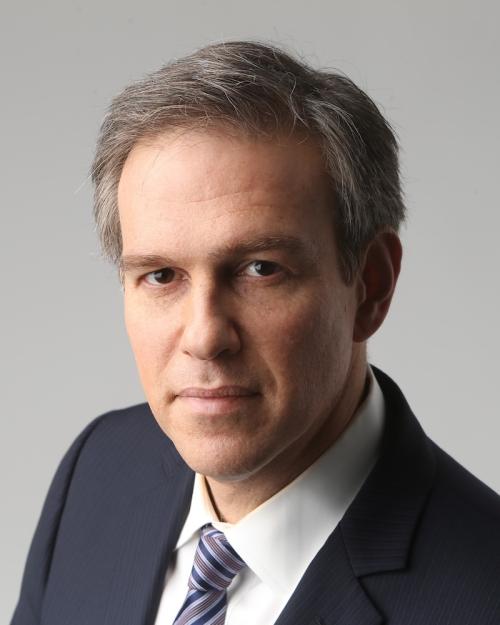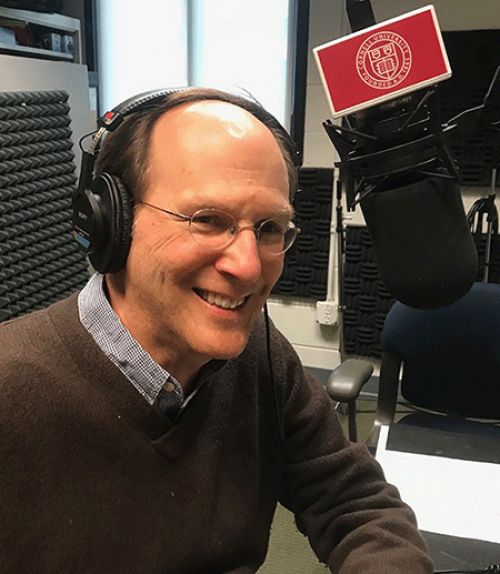Math and science may not seem like the most emotional subjects, but a new podcast aims to give them a whole lot of heart.
On Jan. 22, Quanta Magazine launched the first season of “The Joy of x,” a podcast series hosted by Steven Strogatz, the Jacob Gould Schurman Professor of Applied Mathematics in the College of Arts and Sciences. Over the course of the season’s 12 weekly episodes, Strogatz interviews scientists and mathematicians about their lives and work.
Rather than focusing solely on their research pursuits, Strogatz decided to take a more personal approach.
“I’ve always found radio to be emotional. It’s very intimate to listen to someone talk or tell a story,” he said. “And I think that’s the unique strength of sound and podcasting and the way people listen to podcasts often in their car or at home. The show is primarily a look at the inner lives of scientists, stuff you wouldn’t see in the newspaper. I wanted something that could be moving, or funny or surprising, as well as have scientific heft.”
For years, Strogatz has been an enthusiastic public communicator, with a wide range of outreach efforts. He has been a frequent guest on programs such as “Radiolab” and “Science Friday,” and he has written a number of popular books, as well as articles for media outlets like Scientific American and The New Yorker. He was already mulling the idea of creating a math podcast when Quanta editor Thomas Lin asked if he might be interested in hosting a show that explored the magazine’s key areas of math, physics, biology and computer science.
Strogatz, who serves on Quanta’s science advisory board, teamed up with executive producer Ellen Horne, with whom he worked on “Radiolab.” They decided to call the new podcast “The Joy of x,” after Strogatz’s 2012 book of the same name, which had grown out of “The Elements of Math,” an online column he wrote for the New York Times.
The title “The Joy of x” was initially a math-inspired pun on the classic 1972 manual “The Joy of Sex,” but for Strogatz the phrase has evolved to encompass more than just algebra, which makes it perfectly suited for the podcast.
“Science is about finding out answers to the unknown,” he said, “and the show is meant to be about the joy of curiosity, of discovery, of being a scientist.”
Among the first season’s guests are theoretical cosmologist Janna Levin, string theorist Robbert Dijkgraaf, neurobiologist Cori Bargmann and social-cognitive psychologist Brian Nosek. Some guests are colleagues Strogatz has known for years; some are new acquaintances. But all of them were chosen, he said, because they’re either great science communicators or have fascinating stories to share.
“We want to let the listener feel like a fly on the wall as two scientists have a heart-to-heart conversation,” he said. “They can tell me about their setbacks or their triumphs or their childhood, all kinds of intimate things. I still want it to be powerful science and educational.”
Strogatz interviews his guests remotely from Cornell Broadcast Studios. When the interviews are edited, he adds narration, segues and additional context when needed. Even though he isn’t talking to his subjects face to face, he has developed a few tactics – he calls them “crowbars” – for encouraging people to open up.
“If you get people talking about their mentors, that usually triggers such affectionate memories,” he said. “Although not always. Sometimes a mentor is remembered as selfish or as someone who stole a student’s work, and then they hated that person the rest of their life. But you will always get something revealing.”
Strogatz has worked to find the right balance between discussing life experiences and research interests, while also keeping the hourlong interviews on track. He and his producers do enough preparation beforehand to facilitate a well-informed conversation while still leaving room for spontaneity, curiosity and – sometimes – confusion.
“I want to be a surrogate for the listener. I don’t want to prepare too much. It makes me listen better, which makes the whole thing warmer,” he said. “And it’s good for me to get confused when something is confusing. Then I can ask for clarity. On the other hand, it’s disrespectful not to be prepared at all.”
Quanta, supported by the Simons Foundation, has already ordered a second season, which Strogatz is recording now.
In addition to asking the questions, he’s also managed to learn a thing or two himself.
“In my career, I get to teach, I get to do public outreach, and I also get to do research. In my heart of hearts, I’m a teacher more than anything else,” Strogatz said. “But I also love being a student and getting to learn about all the parts of science that I didn’t know about before, and then trying to explain them. That’s the pleasure of being a professor. You get to do this your whole life.”




